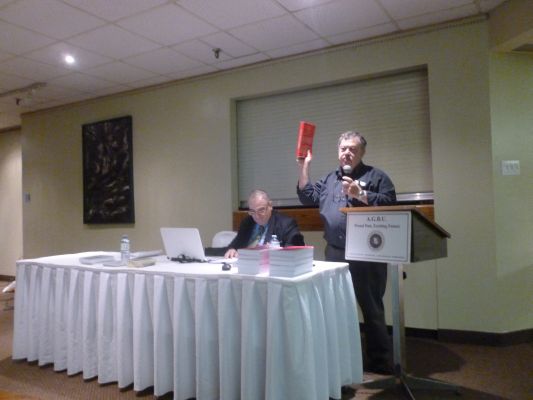July 27, 2015
South Caucasus and Contemporary Geopolitics
By Jirair Tutunjian
Global geopolitical quakes of the past 35 years and their impact, especially on the three republics of the South Caucasus were the topics of Antranig Bedrossian’s scholarly lecture titled “South Caucasus: a Zone of cooperation or division between the European Union and Russia?” at the AGBU Centre in Toronto July 9. Some 50 people attended the speech, the most recent in a series on politics and public affairs organized by Keghart.com and the AGBU.
Bedrossian, the president and co-founder of Montreal-based Nakhijevan Institute of Canada, centered its discussion around two main points: a) South Caucasus, its socio-economic and political conditions, its transformation into a corridor of pipelines and communications, while presenting in the same time data of trade relations of each of the three countries with both EU and Russia. b) The main features of the integration plans proposed by Russian-led Customs’ Union (and Eurasian Economic Union) and the Association Agreement by the European Union. Through comparative analysis the economic, geopolitical and security components were explored and highlighted.
The discussion also delivered a capsule history of the birth of the neo-liberalism in the early ‘80s in the Thatcher-Reagan era, the collapse of the Soviet Union, NATO expansion in Eastern Europe, Russia’s resistance to the West’s incursion into its traditional area of influence, and the impact of these tectonic developments on the South Caucasus.
Bedrossian, who has an MA in international relations, asserted that within the context of globalized capitalism, the main characteristics of the “social state”, as it was instituted in the West since 1945, were reduced, if not eliminated, and were transformed in order to cater to the interests of the dominant socioeconomic forces. The three major institutions that the West deployed to advance its interests and establish structured relations on a global scale were the World Bank, the International Monetary Fund, and the World Trade Organization. Following the collapse of the Soviet Union and its communist ideology, the 15 Soviet republics were left with no choice but to join the world capitalist chorus. On the other hand, Russia under Vladimir Putin regained some of the status it enjoyed in the post-WWII world, and energized by petro-dollars, has embarked upon launching first a regional customs’ union and then an economic union in the former soviet space to compete with the projects of the European Union and the U.S. operating in the same economic space.
Like other regions of the world, the South Caucasus was also impacted by the above trends. In addition, it became an arena for the East/West face-off. Playing by the rules of the neo-liberal Western colossus, the three republics—Armenia, Azerbaijan, and Georgia—adopted three strategies while being courted by Russia and the West.
Armenia wanted to have a foothold in both camps but failed because the strategy was initially untenable: Russia and Europe insisted on an “either or” integration: join either the European Union or the Eurasian Union. However, after Armenia opted for the Eurasian Union two year ago, the EU—in recent months–has made approaches to Armenia for a new and more flexible understanding on the part of the EU.
Georgia’s strategy vis-a-vis Russia and the EU has been diametrically different from that of Armenia’s. Georgia was eager to join the EU and NATO. In both instances, Tbilisi’s dreams of full integration with the West failed and it only ended up by signing the Association Agreement with EU. In recent months, there have been indications that Georgia might also be willing to open a cooperation line with Russia.
Azerbaijan, lolling in petro dollars, has been cool to Russian and EU advances. Baku would co-operate with both organizations but would sit on the fence for the time being. Azerbaijan knows full well that while it has oil and gas, the diplomatic and economic courtiers would make a bee-line to Baku.
Bedrossian, the author of several books and numerous articles on politics, pointed out that how the strategic importance of South Caucasus has, in the past decade, transformed the region into a global corridor, but because of Turkey’s and Azerbaijan’s hostility towards Armenia, the “highways” have by-passed Armenia, rendering it even more isolated.
Returning to the theme of neo-liberalism and the enforced privatization in the South Caucasus, Bedrossian said the Western “shock treatment” adopted by the three South Caucasus states under the patronage of IMF, has created monopoly capitalism and oligarchy. The states’ assets (natural resources, infrastructures and industries) were sold at fire-sale prices to individuals and corporations, most factories were shuttered and the wealth of the country concentrated in a few hands. “In the case of Armenia, the privatization resulted in the concentration of the wealth in the hands of 45-50 families now controlling 54-70% of the country’s national wealth’, he said. To maintain their power, the oligarchs, are well connected to the political circles, and even hold positions in the state institutions. Under these conditions, how the interest of the average Armenian citizen can be maintained, questioned Bedrossian.
The speaker also outlined the integration processes in the European Union and the proposed Russian-led Customs’ Union (and the economic Union). In the former, member states have relinquished some of their sovereignty to the supranational institutions, bound by various treaties and agreements, and incorporating economic, political and wider security concerns, including non military ones. In the latter, the proposed Eurasian Customs’ and Economic Union is confined to economic integration between sovereign states of the former soviet space. According to the Russian-led plan, political relations will be maintained on a bilateral basis between states, while the security issues will be handled through the collective security organization.
In promoting its bloc of integration between states, Russia preached the importance of moving towards a multi-polar world rather than remaining under the hegemony of the United States. In addition to establishing the Eurasian Union as a counter balance to the EU, Russia is also an avid member of another economic bloc: BRICS (Brazil, Russia, India, China, and South Africa) organization.
While Bedrossian stated the facts about the competition between world’s regions in an unbiased and scholarly manner, it was obvious that he is a proponent of a multi-polar globe and prioritizes Armenia’s partnership with Russia. He stressed that because of a long shared history in the geopolitical neighborhood of South Caucasus (or Transcaucasia), Armenians and Russians have working and cultural ties together. He also alleged that the West has little interest in developing Armenian science and industry and is interested in Armenia, mainly as a mineral resource, cheap labor and intellectual capital supplier.
The speech was followed by a brief but lively Q & A. Dr. Dikran Abrahamian, the publisher of Keghart.com was master of ceremonies.

